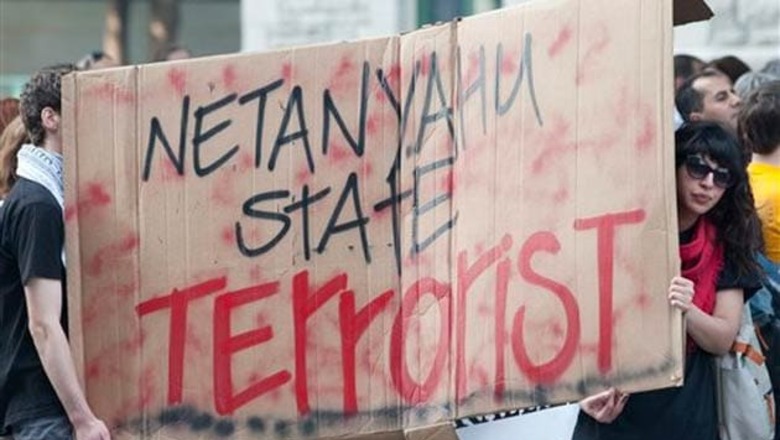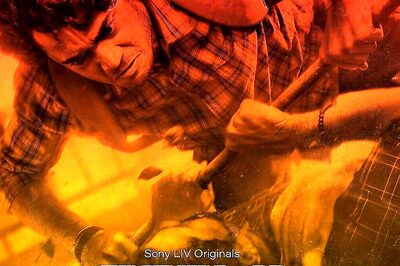
views
United Nations: Israeli police questioned on Tuesday hundreds of international activists arrested aboard Turkish-backed aid ships bound for Gaza in a naval operation that left nine people dead and sparked an international outcry.
The UN Security Council met in emergency session to discuss Israel's storming of the flotilla, with most members of the 15-nation body calling for a thorough investigation.
"This is tantamount to banditry and piracy," Turkish Foreign Minister Ahmet Davutoglu told the council. "It is murder conducted by a state." Most of those who died in the incident were Turks, according to one senior Israeli officer.
Big questions were unanswered: notably, how far Israel could continue to blockade 1.5 million Palestinians in the Gaza Strip after condemnation from allies; and how Israeli commanders miscalculated the situation and dropped marines onto a Turkish ship where they felt they had to open fire to save their lives.
Prime Minister Benjamin Netanyahu, flying home from Canada after cancelling a White House meeting on Tuesday with President Barack Obama, planned to convene his Cabinet on his return to Jerusalem, officials traveling with him said.
Some 700 activists, many Turks but including Israelis and Palestinians as well as Americans and many Europeans -- among them politicians, a Jewish Holocaust survivor and Swedish author -- were held in and around Israel's port of Ashdod, where the six ships of the blockade-running convoy had been escorted.
They were detained incommunicado, ensuring no contradiction of Israel's version of Monday's events. The military said the nine activist were killed when commandos, who stormed aboard a Turkish cruise ship from dinghies and helicopters, opened fire in what Netanyahu said was self-defense.
Israeli Internal Security Minister Yitzhak Aharonovitch said most detainees would be free to go once they had undergone a process of checks and interrogation lasting about half an hour:
"They will have a medical examination, an investigation, questioning, and afterwards, whoever wants to leave Israel can go to (Tel Aviv) airport," he told local television.
Exceptions would be those suspected of involvement in violence. They would face prosecution, the minister said.
European nations, as well as the United Nations and Turkey, voiced shock and outrage at the bloody end to the international campaigners' bid to break Israel's blockade of the Gaza Strip.
Once-close Muslim ally Turkey accused Israel of "terrorism" in international waters.
Many Security Council members criticized the Israeli action with degrees of vehemence, and said it was time for Israel's three-year-old blockade of Hamas-controlled Gaza to be lifted.
Following a 90-minute open meeting, the council went into closed-door consultations. Diplomats said envoys were haggling over the text of a proposed statement by the council, a task that dragged on into the evening.
The European Union, a key aid donor to Palestinians, demanded an inquiry and an end to the embargo.
Israel's most powerful friend, the United States, was more cautious -- disappointing Turkey. President Barack Obama said he wanted the full facts soon and regretted the loss of life.
Secretary of State Hillary Clinton spoke by phone with Israeli Defence Minister Ehud Barak, who provided "some initial details" of the incident, her spokesman, PJ Crowley, said.
"Ultimately, this incident underscores the need to move ahead quickly with negotiations that can lead to a comprehensive peace in the region," Crowley said later in a statement.
Netanyahu says troops were attacked
Netanyahu voiced regret but said his troops were attacked. And he vowed to maintain the three-year-old embargo to stop Iranian-backed Hamas from bringing arms to Gaza.
The White House meeting had seemed intended to soothe ties with Obama, which have been strained by differences over peace negotiations with the Palestinians. But Obama must also balance support for Israel -- popular with American voters -- with understanding for an angry Turkey and other Muslim U.S. allies.
Western-backed Palestinian President Mahmoud Abbas, no friend of Hamas, called the Israeli operation a "massacre."
His Fatah faction made some conciliatory noises to its Islamist rivals in Hamas, whose violent seizure of Gaza in 2007 prompted Israel to tighten a blockade on the coastal strip.
A visit by Abbas loyalists from the Israeli-occupied West Bank to the Hamas-controlled Gaza Strip may be in the works.
A day after the pre-dawn operation some 120 km (75 miles) out in the Mediterranean details were sketchy and limited to those from the Israeli side. Activists were incommunicado.
Military night-vision video showed commandos being winched down, only to be set upon. Some Israeli commentators asked why commanders put troops into a position where they were cornered.
Military officials said some activists had snatched pistols from the boarding party, which responded to gunfire.
The bloodshed sparked street protests and government ire in Turkey, long Israel's lone Muslim ally in the region.
Prime Minister Tayyip Erdogan, whose Islamist views and outreach to Iran and other Israeli enemies are blamed by many in Israel for souring relations, called it "state terrorism."
Israeli forces were on high alert but aside from scattered scuffles, there was little trouble with Palestinian protesters.
Demonstrations in European cities included Paris, Stockholm, Rome and Athens, where police used teargas against protesters who threw stones and bottles near Israel's embassy to Greece.
The outrage sounded at times more uniformly hostile to the Jewish state than during its offensive in Gaza, which killed 1,400 Palestinians in December 2008 and January 2009.
Israel said it launched that war to curb Hamas rocket fire on its towns. But it has found it harder to win understanding for an embargo limiting supplies to Gaza's civilians, including cement the UN says it needs to repair bomb damage.




















Comments
0 comment